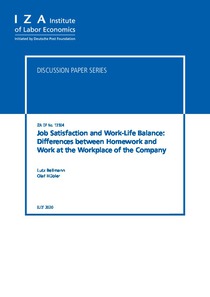Job satisfaction and work-life balance: differences between homework and work at the workplace of the company

Institute of Labor Economics, Bonn
IZA - Bonn
2020
epidemic disease ; telework ; job satisfaction ; work-life balance ; quality of working life
Discussion Paper
13504
Quality of working life
http://ftp.iza.org/dp13504.pdf
English
Bibliogr.
"Working remotely can complement and sometimes completely substitute conventional work at the workplace of the company. Until the COVID-19 crisis the share of remote workers was relatively low and empirical investigations show inconsistent results. The recent work has highlighted a dramatic shift toward working from home The objective of this contribution is to empirically analyze the relationship between working remotely and job satisfaction on the one hand, as well as between working remotely and work-life balance on the other hand, based on three waves of the German Linked Personnel Panel. Our control variables are personality traits, skills, employment and job characteristics. We present average effects and demonstrate under which conditions remote work is advantageous for employees. Work-life imbalance may be induced by job-related causes. A private life can reduce work-life balance under specific conditions, namely, if remote work takes place outside of contracted working hours and during the first phase of remote work. On average, remote work has no significant impact on work-life balance, which is conditioned by private interests. However, the termination of remote work causes a clear imbalance. In contrast, the introduction of remote work increases job satisfaction, although only temporarily. When we compare employees working from home with those who want to work at home, we find that the former are happier. If we consider remote workers only, our results reveal that job satisfaction is higher, and work-life balance is not worse under a strict contractual agreement than under a nonbinding commitment."
Digital
The ETUI is co-funded by the European Union. Views and opinions expressed are however those of the author(s) only and do not necessarily reflect those of the European Union or the ETUI.